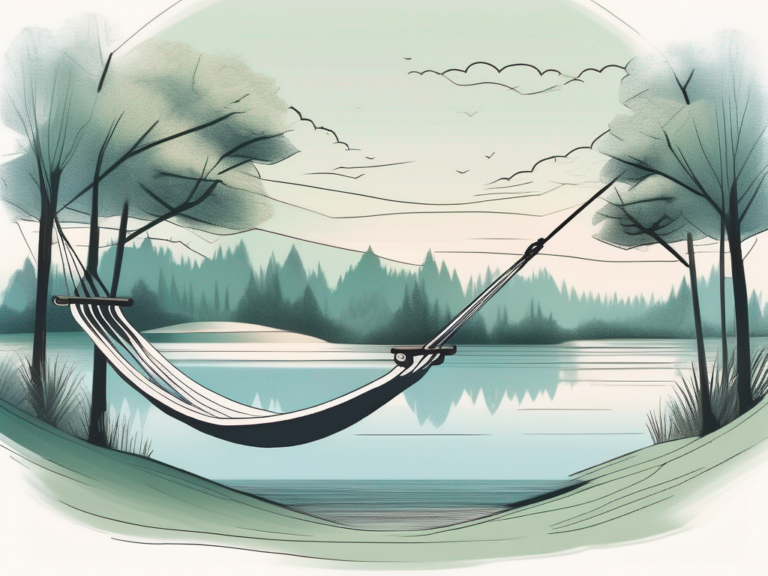10 Relaxation Quotes to Help You Unwind and Find Inner Peace
Life can be overwhelming at times, with endless to-do lists, deadlines, and responsibilities weighing us down. It’s crucial to find moments of relaxation and inner peace amidst the chaos. In this article, we will explore the power of relaxation and its connection to our mental well-being. We will also delve into the impact of positive affirmations and how incorporating quotes into our daily routine can inspire and uplift us. Finally, we will provide practical tips on how to apply these relaxation quotes in our lives, ensuring long-term inner peace and tranquility.
Understanding the Importance of Relaxation and Inner Peace
It’s easy to underestimate the significance of relaxation and inner peace in our lives. We often prioritize productivity and external achievements, neglecting the vital role that peace of mind plays in our overall well-being. However, taking the time to unwind and rejuvenate is essential for our mental and physical health.
Research has shown that relaxation techniques, such as deep breathing and meditation, can lower stress levels and reduce anxiety. When we allow ourselves to relax, we give our minds and bodies the opportunity to recharge and restore balance.
The Connection Between Relaxation and Mental Health
Our mental health is closely intertwined with our ability to relax and find inner peace. Chronic stress and anxiety can have detrimental effects on our mental well-being, leading to depression and other mood disorders. By incorporating relaxation techniques into our daily lives, we can alleviate these symptoms and promote mental clarity and emotional resilience.
Studies have shown that regular relaxation practices, such as yoga and mindfulness meditation, can improve cognitive function and enhance our ability to focus and concentrate. Taking the time to unwind allows us to release tension and clear our minds, enabling us to approach challenges with a renewed sense of calm and clarity.
How Inner Peace Contributes to Overall Well-being
Inner peace goes beyond merely relaxing; it encompasses the feeling of contentment and harmony within ourselves. When we achieve inner peace, we experience a profound sense of well-being that positively impacts all areas of our lives.
Inner peace allows us to navigate life’s challenges with grace and resilience. It enables us to respond to difficult situations with clarity and compassion, rather than reacting impulsively out of stress or anxiety. By cultivating inner peace, we cultivate self-acceptance and self-compassion, which are essential for our personal growth and happiness.
Moreover, finding inner peace can also have physical benefits. When we are stressed, our bodies release stress hormones like cortisol, which can have negative effects on our immune system. However, by practicing relaxation techniques and finding inner peace, we can reduce the production of stress hormones and strengthen our immune system. This can lead to a lower risk of developing chronic illnesses and a stronger overall physical health.
Additionally, inner peace can improve our relationships with others. When we are at peace with ourselves, we are more likely to approach interactions with kindness, empathy, and understanding. This can foster healthier and more fulfilling connections with our loved ones, colleagues, and even strangers we encounter in our daily lives. Inner peace can create a ripple effect, spreading positivity and harmony in our social interactions.
The Power of Words: How Quotes Can Inspire Relaxation
Quotes have the power to uplift and motivate us. They have a unique way of resonating with our experiences and emotions, providing us with perspective and insight. Incorporating relaxation quotes into our daily lives can be a simple yet effective way to inspire and cultivate a sense of peace within ourselves.
The Psychological Impact of Positive Affirmations
Positive affirmations are statements that reflect our inner desires and intentions. By repeating these affirmations regularly, we can reprogram our subconscious mind and replace negative thought patterns with positive ones. Positive affirmations have been shown to boost self-esteem, reduce stress, and promote a positive mindset.
When it comes to relaxation, positive affirmations can help reframe our thoughts and shift our focus towards tranquility and serenity. By repeatedly affirming phrases such as “I am calm and relaxed” or “I deserve peace and tranquility,” we can manifest these feelings in our lives and invite relaxation into our minds and bodies.
Imagine waking up in the morning, feeling refreshed and ready to take on the day. As you sip your cup of warm tea, you open your quote journal and read a powerful quote that resonates with your current state of mind. The words jump off the page and wrap around you like a comforting embrace, reminding you of the importance of self-care and relaxation.
Incorporating Quotes into Your Daily Routine
Integrating quotes into our daily routine allows us to infuse our lives with inspiration and positivity. One way to do this is by creating a quote journal or setting up a quote of the day reminder on our phones. By reading these quotes regularly and reflecting on their meaning, we can deepen our understanding of their wisdom and incorporate their messages into our lives.
But why stop there? Let’s take it a step further. Imagine having a dedicated space in your home where you display your favorite relaxation quotes. Whether it’s a beautifully framed print on your bedroom wall or a small chalkboard in your living room, these visual reminders can serve as constant sources of inspiration and relaxation. Every time you pass by, you can’t help but pause for a moment, taking in the words and allowing their soothing energy to wash over you.
Another powerful way to incorporate quotes into our routine is through meditation and visualization. By choosing a relaxation quote that resonates with us, we can use it as a focal point during meditation, allowing its essence to permeate our minds and bodies. Visualizing ourselves embodying the qualities described in the quote can enhance our ability to relax and find inner peace. As we close our eyes and let the words sink in, we can feel the tension melting away, replaced by a deep sense of calm and tranquility.
Exploring the 10 Relaxation Quotes
Quote 1: Unpacking its Meaning and Application
“In the depth of winter, I finally learned that there was, in me, an invincible summer.” – Albert Camus
This powerful quote reminds us that even in the darkest moments of our lives, we have an unshakable source of strength and resilience within us. By embracing this inner light, we can find solace and peace in the face of adversity.
To apply this quote in our lives, we can take moments of introspection and connect with the part of ourselves that remains untouched by external circumstances. By focusing on this invincible inner summer, we can maintain a sense of optimism and inner peace.
Quote 2: Unpacking its Meaning and Application
“Relaxation means releasing all concern and tension and letting the natural order of life flow through one’s being.” – Donald Curtis
This quote reminds us of the importance of surrendering control and allowing life to unfold naturally. It emphasizes the need to let go of worries and tensions that prevent us from experiencing true relaxation and inner peace.
To apply this quote, we can practice letting go of attachment to outcomes and surrendering to the present moment. By releasing concerns and trusting in the natural flow of life, we can cultivate a sense of ease and relaxation.
Quote 3: Unpacking its Meaning and Application
“Your calm mind is the ultimate weapon against your challenges.” – Bryant McGill
This quote highlights the power of a calm mind when facing challenges. It reminds us that by cultivating inner peace, we become better equipped to navigate difficulties with clarity and strength.
To apply this quote, we can incorporate mindfulness techniques such as deep breathing or meditation into our daily routine. By practicing these techniques regularly, we can develop a calm and centered mindset that allows us to face challenges with grace and resilience.
Now that we have explored the meaning and application of these three relaxation quotes, let’s delve into two more quotes that offer further insights into the art of relaxation.
Quote 4: Unpacking its Meaning and Application
“Tension is who you think you should be. Relaxation is who you are.” – Chinese Proverb
This profound proverb reminds us that tension arises when we try to conform to societal expectations and suppress our true selves. True relaxation, on the other hand, comes from embracing our authentic nature and living in alignment with our values.
To apply this quote, we can reflect on the areas of our lives where we feel tension and ask ourselves if we are being true to who we are. By letting go of societal pressures and honoring our authentic selves, we can experience a deep sense of relaxation and fulfillment.
Quote 5: Unpacking its Meaning and Application
“Relaxation is not the absence of stress, but the ability to cope with it.” – Unknown
This quote challenges the common misconception that relaxation means being completely stress-free. Instead, it suggests that true relaxation lies in our ability to effectively manage and cope with stress.
To apply this quote, we can focus on developing healthy coping mechanisms for stress, such as engaging in regular exercise, practicing self-care, and seeking support from loved ones. By building resilience and learning to navigate stress in a healthy way, we can cultivate a state of relaxation even in the midst of life’s challenges.
Practical Ways to Apply These Quotes in Your Life
Mindfulness Techniques for Relaxation
Mindfulness is a powerful tool for relaxation and finding inner peace. By being fully present in the moment and observing our thoughts and sensations without judgment, we can release stress and anxiety.
One way to incorporate mindfulness into our lives is through daily meditation. Find a quiet space, sit comfortably, and focus on your breath. Observe each inhalation and exhalation, allowing your mind to settle and your body to relax.
In addition to formal meditation, you can also practice mindfulness in everyday activities. Whether it’s taking a walk in nature, savoring a meal, or simply pausing to appreciate the beauty around you, embracing mindfulness can bring a sense of calm and relaxation into your life.
Imagine yourself strolling through a serene forest, the sunlight filtering through the leaves and casting gentle shadows on the ground. As you walk, you notice the sound of birds chirping and the rustle of leaves under your feet. Each step you take is deliberate and mindful, grounding you in the present moment and allowing you to let go of any worries or stress.
Now, picture yourself sitting at a table, a delicious meal in front of you. Take a moment to truly savor each bite, noticing the flavors, textures, and aromas. As you eat mindfully, you become aware of the nourishment this meal provides, not just for your body, but also for your soul. It’s a moment of pure indulgence and relaxation.
Creating a Peaceful Environment at Home
The environment we surround ourselves with has a significant impact on our state of mind. By creating a peaceful and harmonious living space, we can enhance our relaxation and foster a sense of inner peace.
Start by decluttering and organizing your home. A tidy space promotes clarity and reduces stress. Incorporate elements of nature, such as plants or natural materials, to bring a sense of tranquility indoors. Play soothing music or light scented candles to create a calming ambiance.
Designate a specific area in your home for relaxation and self-care. It could be a comfortable corner with pillows and blankets, a meditation space, or a cozy reading nook. Having a dedicated space for relaxation signals to your mind that it’s time to unwind and find inner peace.
Imagine yourself in your newly organized and serene living space. The soft glow of candlelight illuminates the room, casting a warm and inviting atmosphere. The gentle scent of lavender fills the air, instantly soothing your senses. As you settle into your cozy corner, you wrap yourself in a soft blanket and feel the stress of the day melt away. This is your sanctuary, a place where you can escape from the outside world and find solace.
Surrounding yourself with elements that bring you joy and peace is essential in creating a harmonious environment. Incorporate artwork or photographs that evoke positive emotions, hang curtains that let in natural light, and choose furniture that is both comfortable and aesthetically pleasing. By curating your living space with intention, you create a sanctuary that nurtures your well-being and promotes relaxation.
Maintaining Inner Peace and Relaxation Long-Term
Building a Consistent Relaxation Routine
Consistency is key when it comes to maintaining inner peace and relaxation. By establishing a regular relaxation routine, we create a habit that becomes ingrained in our daily lives.
Set aside dedicated time each day for relaxation. This could be in the morning to start your day on a calm note, during your lunch break to recharge, or in the evening to unwind before bed. Experiment with different relaxation techniques and find what works best for you.
Remember that relaxation is not a one-size-fits-all approach. What brings peace to one person may not resonate with another. Listen to your body and intuition, and tailor your routine to align with your needs and preferences.
Overcoming Challenges to Inner Peace
While cultivating inner peace is a lifelong journey, there will inevitably be challenges along the way. Life is full of ups and downs, and maintaining a sense of relaxation can sometimes feel elusive.
During challenging times, it’s essential to practice self-compassion and patience. Be kind to yourself and acknowledge that setbacks are a natural part of the process. Embrace small moments of relaxation, even in the midst of chaos.
Reach out for support when needed. Whether it’s talking to a trusted friend or seeking guidance from a therapist, don’t hesitate to ask for help. Sometimes, external support can provide fresh perspectives and insights that help us navigate difficult situations.
The Power of Mindfulness
One powerful tool for maintaining inner peace and relaxation is mindfulness. Mindfulness is the practice of being fully present in the moment, without judgment. By cultivating mindfulness, we can create a sense of calm and clarity in our lives.
There are many ways to incorporate mindfulness into your daily routine. You can start by simply taking a few minutes each day to focus on your breath and observe your thoughts and sensations without getting caught up in them. This practice can help you develop a greater sense of self-awareness and reduce stress.
In addition to formal mindfulness practices, you can also bring mindfulness into everyday activities. Whether it’s eating a meal, walking in nature, or engaging in a hobby, try to fully immerse yourself in the experience. Notice the sensations, thoughts, and emotions that arise without judgment.
The Importance of Self-Care
Another crucial aspect of maintaining inner peace and relaxation is practicing self-care. Self-care involves taking intentional actions to nurture and care for your physical, mental, and emotional well-being.
Self-care looks different for everyone, as it is highly individualized. It can include activities such as taking a warm bath, practicing yoga or meditation, reading a book, or spending time in nature. The key is to prioritize activities that bring you joy and help you recharge.
Remember that self-care is not selfish. Taking care of yourself allows you to show up fully for others and be the best version of yourself. It is an act of self-love and compassion.
In conclusion, finding relaxation and inner peace in today’s fast-paced world is crucial for our overall well-being. By understanding the importance of relaxation and its connection to our mental health, incorporating quotes into our daily routine, and applying practical tips, we can cultivate a sense of tranquility and balance in our lives. Remember, relaxation is not a destination; it’s a continuous journey that requires commitment and self-care. Embrace it, and experience the profound impact it can have on your well-being.






